高考英语虚拟语气总结
- 格式:ppt
- 大小:626.50 KB
- 文档页数:35

高考虚拟语气总结一.概念:虚拟语气是扯淡的句子。
我们在初中二年级学习过一个句子:If I were you, I would call him now.虚拟语气有从句和主句。
高考考的就是从句和主句里分别用的什么时态。
为什么用I were,而不用I was?因为我不是你,所以只能I were.If I had 5 million,I would buy a Lamborghini.二.按时间分类从句主句跟现在相反were(did) would do跟过去相反had been(had done) would have done 跟将来相反were to do would doShould do首先记住一句话If I were you ,I would do it now.然后再进行推导。
高考考的最多的是跟过去相反。
跟过去相反,主句从句中都有have 的身影。
跟现在相反的口诀:主过将,从过跟过去相反的口诀:主过将完,从过完三.现在If I ___ you ,I wouldn’t return the call.A.BeB.AmC.WasD.WereWere it not for the snowy weather,we ___be all right.A.Would beB.Would have beenC.May beD.Were____I you, I would go with him to the party.A.WasB.Had beenC.Will beD.Were四。
过去If I ____more time,I would have gone with him.A.HadB.Had hadC.Have hadD.Would haveIf we ___here ten minutes earlier, we___the bus. A.Arrived ;would catchB.Arrived; would have caughtC.Had arrived;had caughtD.Had arrived;would have caught五.将来If it were to snow this evening,we would not go out.If it were Sunday tomorrow, I should go to see my grandmother.六.混合虚拟If I were you, I would have taken his advice.If he had listened to the teacher attentively,he would know the answers now.(注意本句中的now)--Could you tell me how to do this excercise?--Well,if you had listened to the teacher yesterday, you would know how to do it now.混合虚拟中有明显的时间状语提示你。

虚拟语气虚拟语气表示说话人的愿望,假设,猜测或建议,而不是表示客观存在的事实。
高考考查虚拟语气主要和情态动词相结合。
1(1be动词的过去式用were”。
如:►. If I were a boy, I would join the army.►(2则用过去分词”►(4)当条件状语从句表示的行为和主句表示的行为所发生的时间不一致时,动词的形式要根据它所表示的时间作相应调整。
如:►. If they had worked hard, they would be very tired.(从句说的是过去,主句指的是现在)►. Were I a boy, I would join the army.►. Had he taken my advice, he would have succeeded.►. Were it not for the expense, I would go to Britain.2、虚拟语气用于名词性从句(①。
表示不能实现的愿望,译为“要是……就好了”等。
表示将来不能实现的愿望,从句中的谓语动词用“would/could + 动词原形”;表示过去不能实现的愿望,从句中的谓语动词用“had + 过去分词”或“could(should) + have + 过去分词”。
如:►. I wish it were spring all the year round.►. I wish I had known the answer.►suggest, advise, propose, demand, require, insist, request,should + 动词原形或是动词原形。
如:►. She suggested we (should) leave here at once.►(2作表示建议、等的表语从句和同位语从句,从句中的谓语动词用“(should)+ 动词原形”。
如:►. His suggestion that we (should)go to Shanghai is wonderful.►(3“should + 动词原形”►. It is necessary (important, natural, strange, etc.) that we should clean the room every day.►. It was a pity (a shame, no wonder, etc.) that you should be so careless.►. It will be desired (suggested, decided, ordered, requested, proposed, etc.) that she should finish her homework this afternoon.注意:这种从句表示的是事实。
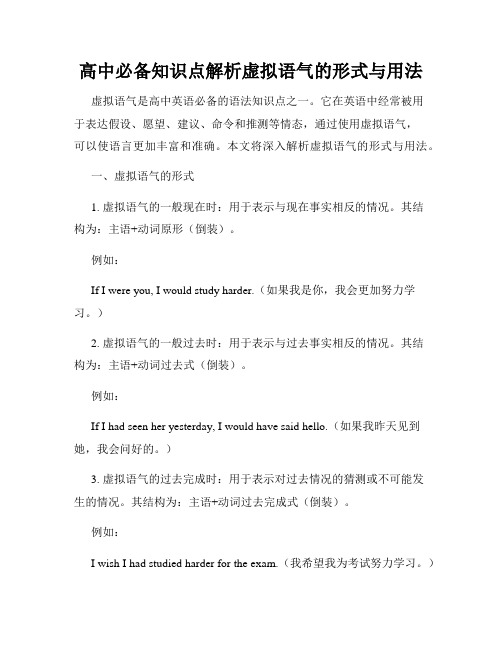
高中必备知识点解析虚拟语气的形式与用法虚拟语气是高中英语必备的语法知识点之一。
它在英语中经常被用于表达假设、愿望、建议、命令和推测等情态,通过使用虚拟语气,可以使语言更加丰富和准确。
本文将深入解析虚拟语气的形式与用法。
一、虚拟语气的形式1. 虚拟语气的一般现在时:用于表示与现在事实相反的情况。
其结构为:主语+动词原形(倒装)。
例如:If I were you, I would study harder.(如果我是你,我会更加努力学习。
)2. 虚拟语气的一般过去时:用于表示与过去事实相反的情况。
其结构为:主语+动词过去式(倒装)。
例如:If I had seen her yesterday, I would have said hello.(如果我昨天见到她,我会问好的。
)3. 虚拟语气的过去完成时:用于表示对过去情况的猜测或不可能发生的情况。
其结构为:主语+动词过去完成式(倒装)。
例如:I wish I had studied harder for the exam.(我希望我为考试努力学习。
)二、虚拟语气的用法1. 表达假设与条件:If I were you, I would travel around the world.(如果我是你,我会环游世界。
)I wish I had a million dollars.(我希望我有一百万美元。
)2. 表达愿望与建议:I wish you would stop smoking.(我希望你戒烟。
)It's important that she arrive on time.(她按时到达很重要。
)3. 表达命令与要求:The teacher ordered that the students be quiet.(老师要求学生们保持安静。
)She insisted that he leave immediately.(她坚持要他立刻离开。
)4. 表达推测与猜测:He looks as if he were sick.(他看起来像是生病了。
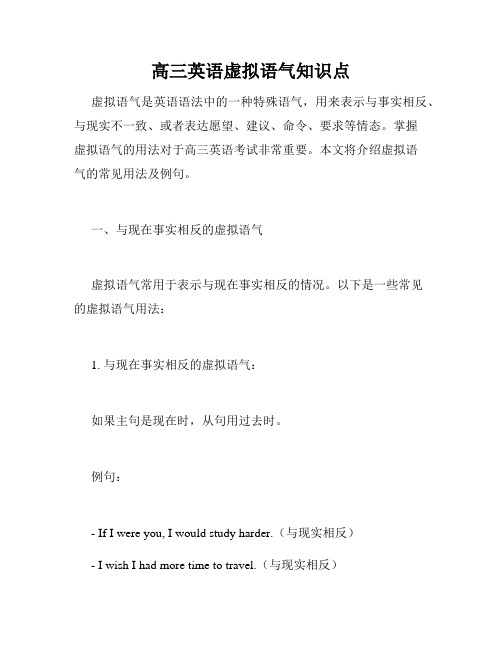
高三英语虚拟语气知识点虚拟语气是英语语法中的一种特殊语气,用来表示与事实相反、与现实不一致、或者表达愿望、建议、命令、要求等情态。
掌握虚拟语气的用法对于高三英语考试非常重要。
本文将介绍虚拟语气的常见用法及例句。
一、与现在事实相反的虚拟语气虚拟语气常用于表示与现在事实相反的情况。
以下是一些常见的虚拟语气用法:1. 与现在事实相反的虚拟语气:如果主句是现在时,从句用过去时。
例句:- If I were you, I would study harder.(与现实相反)- I wish I had more time to travel.(与现实相反)2. 表达建议、要求或命令等的虚拟语气:主句用“should”或“ought to”引导,从句用动词原形。
例句:- It is necessary that she should arrive on time.(建议)- He demanded that they leave immediately.(命令)二、与过去事实相反的虚拟语气虚拟语气还可以用来表示与过去事实相反的情况。
以下是一些常见的虚拟语气用法:1. 与过去事实相反的虚拟语气:如果主句是过去时,从句用过去完成时。
例句:- If he had studied harder, he would have passed the exam.(与过去事实相反)- I wish I hadn't eaten so much.(与过去事实相反)2. 表达愿望、建议或命令等的虚拟语气:主句用“should”或“ought to”引导,从句用动词原形或过去时。
例句:- It is high time that he applied for a job.(建议)- I wish he would stop talking.(愿望)三、与将来事实相反的虚拟语气虚拟语气还可以用来表示与将来事实相反的情况。
以下是一些常见的虚拟语气用法:1. 与将来事实相反的虚拟语气:如果主句是将来时,从句用过去完成时。

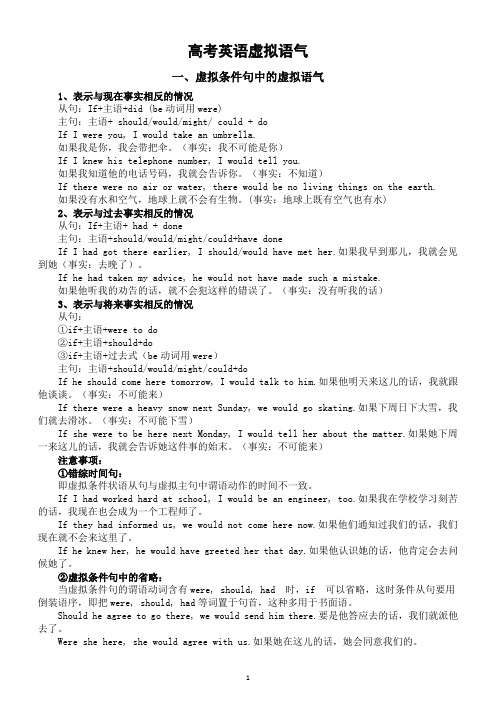
高考英语虚拟语气一、虚拟条件句中的虚拟语气1、表示与现在事实相反的情况从句:If+主语+did (be动词用were)主句:主语+ should/would/might/ could + doIf I were you, I would take an umbrella.如果我是你,我会带把伞。
(事实:我不可能是你)If I knew his telephone number, I would tell you.如果我知道他的电话号码,我就会告诉你。
(事实:不知道)If there were no air or water, there would be no living things on the earth.如果没有水和空气,地球上就不会有生物。
(事实:地球上既有空气也有水)2、表示与过去事实相反的情况从句:If+主语+ had + done主句:主语+should/would/might/could+have doneIf I had got there earlier, I should/would have met her.如果我早到那儿,我就会见到她(事实:去晚了)。
If he had taken my advice, he would not have made such a mistake.如果他听我的劝告的话,就不会犯这样的错误了。
(事实:没有听我的话)3、表示与将来事实相反的情况从句:①if+主语+were to do②if+主语+should+do③if+主语+过去式(be动词用were)主句:主语+should/would/might/could+doIf he should come here tomorrow, I would talk to him.如果他明天来这儿的话,我就跟他谈谈。
(事实:不可能来)If there were a heavy snow next Sunday, we would go skating.如果下周日下大雪,我们就去滑冰。

高考英语语法之虚拟语气(一)语气的种类:英语句子中谓语动词的语气有四种:1. 陈述语气(The Indicative Mood)陈述语气用于直截了当地陈述事实、描述状态:He has publishedquite a number of essays this year .他今年已发表了好几篇论文。
2. 祈使语气(The Imperative Mood)祈使语气用于提出请求、命令、建议或是劝告等:Wait outside untilyou are asked . 请在外面等候,请你进再进去。
Let's just take abreak, shall we ? 我们休息一会儿,好吗?3. 疑问语气( the interrogative mood ) :用来提出问题Where are you from?4. 虚拟语气(The Subjunctive Mood)虚拟语气用于表示主观愿望和假设的虚拟情况。
虚拟语气不太顾及事实的存在,它表现出说话人的主观因素比较多。
所以说话人所讲的内容往往是与事实相反的;或是其实现的可能性微乎其微,甚至于没有实现的可能性。
当然,有时为了使说话的语气客气、缓和、委婉,也使用虚拟语气。
If I had moremoney, I would buy a bigger apartment.我要是有再多一点钱,我就买一套更大一些房子。
(二) 虚拟语气的种类:虚拟语气用来表示说话人的主观愿望或假想,所说的是一个条件,不一定是事实,或与事实相反。
虚拟语气在条件句中应用比较多;条件句可分为两类,一类为真实条件句,一类为非真实条件句。
非真实条件句表示的是假设的或实际可能性不大的情况,故采用虚拟语气。
1.真实性条件句①真实条件句用于陈述语气,假设的情况有可能发生,各种结构如下:条件从句主句一般现在时 shall/will + 动词原形祈使句情态动词一般现在时If he comes, hewill bring his violin. 如果他来,会带小提琴来的。

高中英语虚拟语气知识点总结高中英语虚拟语气知识点总结虚拟语气是英语语法中一种用于描述假设、假想或可能性的语气。
在高中英语中,虚拟语气是一个相当重要的语法知识点。
本文将总结高中英语虚拟语气知识点,帮助学生更好地掌握虚拟语气的使用规则和技巧。
一、虚拟语气的定义及用途虚拟语气指的是表示假想、虚构、愿望、建议等情况的语气。
它强调实现的可能性很小或很远,或者根本就不可能实现。
虚拟语气通常使用“if”引导条件从句或用于表达思想、态度。
虚拟语气的用途主要有以下几个方面:1. 表示假想或虚构情况例如:If I were you, I would not do that.(如果我是你,我不会那么做。
)2. 表示可能性很小或很远例如:If you asked him, he might help you.(如果你问他,他可能会帮你。
)3. 表示愿望、要求或建议例如:I wish I could speak fluent English.(我希望我能说流利的英语。
)二、虚拟语气的形式虚拟语气形式主要有以下几种:1. 虚拟语气的过去式:在虚拟语气中,一般用过去式来表示对现在或未来的虚拟。
例如:If I had more time, I would read more books.(如果我有更多时间,我就会多看书。
)2. 虚拟语气的过去完成式:过去完成式用于表示“如果过去已经发生了某些事情,结果会是怎样”。
例如:If I had studied harder in high school, I would have gone to a better college.(如果我在高中时学习更努力,我就能进入更好的大学。
)3. 虚拟语气的“would + 动词原形”形式:“would +动词原形”形式通常用于表示愿望、要求、建议或者可能性。
例如:I wish you would stop smoking.(我希望你戒烟。
)If you would like to come, you are welcome.(如果你愿意来,欢迎你。
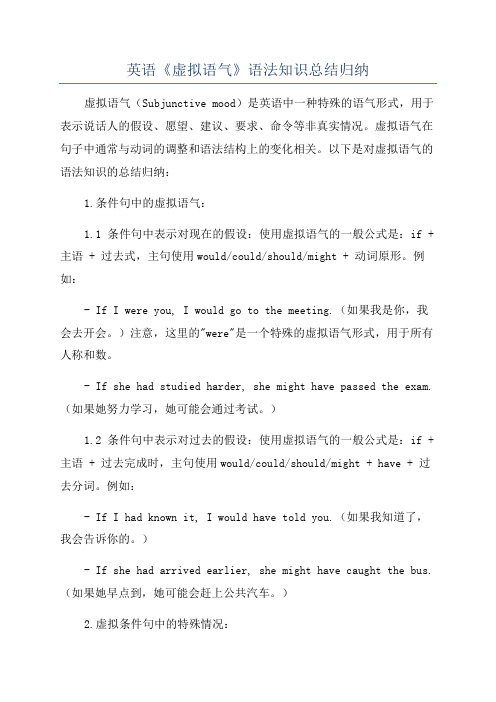
英语《虚拟语气》语法知识总结归纳虚拟语气(Subjunctive mood)是英语中一种特殊的语气形式,用于表示说话人的假设、愿望、建议、要求、命令等非真实情况。
虚拟语气在句子中通常与动词的调整和语法结构上的变化相关。
以下是对虚拟语气的语法知识的总结归纳:1.条件句中的虚拟语气:1.1 条件句中表示对现在的假设:使用虚拟语气的一般公式是:if + 主语 + 过去式,主句使用would/could/should/might + 动词原形。
例如:- If I were you, I would go to the meeting.(如果我是你,我会去开会。
)注意,这里的"were"是一个特殊的虚拟语气形式,用于所有人称和数。
- If she had studied harder, she might have passed the exam.(如果她努力学习,她可能会通过考试。
)1.2 条件句中表示对过去的假设:使用虚拟语气的一般公式是:if + 主语 + 过去完成时,主句使用would/could/should/might + have + 过去分词。
例如:- If I had known it, I would have told you.(如果我知道了,我会告诉你的。
)- If she had arrived earlier, she might have caught the bus.(如果她早点到,她可能会赶上公共汽车。
)2.虚拟条件句中的特殊情况:2.1 在虚拟条件句中表示命令、建议时,主句中的动词可以使用动词原形(而不是would/could/should/might + 动词原形)。
例如:- If you have any questions, please let me know.(如果你有任何问题,请告诉我。
)- If I were you, I would take a break.(如果我是你,我会休息一下。

虚拟语气虚拟语气:表示动作或状态不是客观存在的事实,而是说话人的主观愿望、假设或推测等。
一、if从句:(二)错综时间的虚拟句:通常情况下,在条件句中主句和从句的谓语动词所指时间一致,但有时也可能指不同的时间,这时主句和从句的动作不是发生在同一时间,其动词形式要根据时间而定。
1. If I were you, I would have taken his advice. (从句指现在, 主句指过去)。
2. If I had taken my raincoat with me this morning, I would not be wet now. (从句指过去,主句指现在)。
3. If we hadn’t been working hard in the past few years, things wouldn’t be going so smoothly.(从句指过去,主句指现在)。
4. If the weather had been more favorable, the crops would be growing still better.(从句指过去,主句指现在)。
5. If we had not got everything ready by now, we should be having a more terrible time tomorrow. (从句指现在,主句指将来)(三)省略:If 从句中含有were, should, had时,可省略if并把were, should, had提前。
例如:Were I you, I wouldn’t quarrel with him.备注:注:would, should, could与might的选择:①一般常用would,如同在真实条件句中主句常要用will一样。
常译作“将、就会”。
如:If I knew him, I would ask him for help. 如果我认识他的话,我就会向他求助。

高中语法虚拟语气知识点总结1. 虚拟语气的定义和用途虚拟语气是一种用于表达说话者的愿望、建议、命令、假设、可能性等虚拟情况的语法形式。
它常用于主从复合句中,并带有某些特定的动词、形容词、名词等。
虚拟语气主要有以下用途: - 表达与事实相反的假设、愿望或建议。
- 在间接引语中表示引述内容与事实不符。
- 表达可能性、猜测、推测等与现实不符的情况。
2. 虚拟语气的形式和结构虚拟语气的形式主要包括: - 虚拟语气动词:包括情态动词、动词过去式、动词的特殊形式等。
- 虚拟语气连词:包括if、though、as if、unless等。
虚拟语气在句子中的结构一般为: - 主从复合句中主句为现实情况,从句为虚拟情况。
- 从句中的动词形式常为虚拟语气动词。
- 虚拟语气连词引导虚拟语气从句。
3. 虚拟语气的常见形式和用法3.1 虚拟语气的动词形式常见的虚拟语气动词形式有: - 情态动词should、would、could、might等。
- 动词过去式:常用于wish、if only等引导的句子中。
- 动词的特殊形式:如动词不定式的完成式(to have done)、动词过去分词的完成式(having done)等。
3.2 虚拟语气的使用情况常见的虚拟语气使用情况有: - 虚拟条件句:用于表达与事实相反或不可能实现的条件情况。
常以“if”引导,主句常用情态动词表示愿望、建议、命令等。
- If I were you, I would study harder.(如果我是你,我会更加努力学习。
) - 虚拟假设句:用于描述与事实相反的假设情况,常用过去式表示。
- I wish I had a car.(我希望我有辆车。
) - 虚拟推测句:用于表示对某种情况的推测、猜测,常用情态动词或动词过去式表示。
- He might be late for the meeting.(他可能会迟到会议。
)- 虚拟命令句:用于表示建议、要求或命令,常用should、would等情态动词表示。
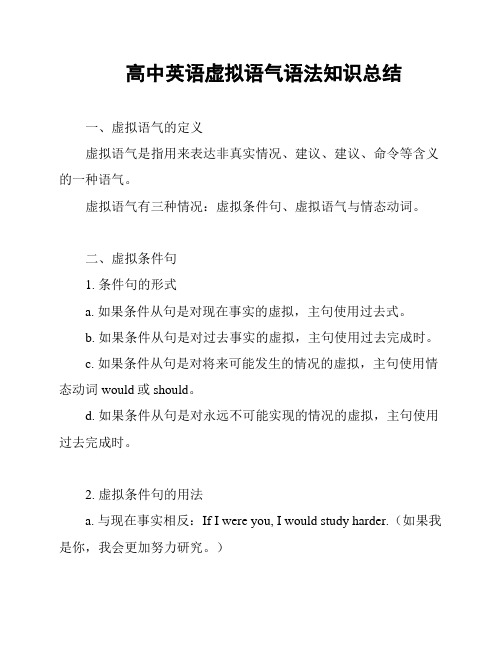
高中英语虚拟语气语法知识总结一、虚拟语气的定义虚拟语气是指用来表达非真实情况、建议、建议、命令等含义的一种语气。
虚拟语气有三种情况:虚拟条件句、虚拟语气与情态动词。
二、虚拟条件句1. 条件句的形式a. 如果条件从句是对现在事实的虚拟,主句使用过去式。
b. 如果条件从句是对过去事实的虚拟,主句使用过去完成时。
c. 如果条件从句是对将来可能发生的情况的虚拟,主句使用情态动词would或should。
d. 如果条件从句是对永远不可能实现的情况的虚拟,主句使用过去完成时。
2. 虚拟条件句的用法a. 与现在事实相反:If I were you, I would study harder.(如果我是你,我会更加努力研究。
)b. 与过去事实相反:If I had known, I would have helped.(如果我当时知道,我会帮忙的。
)c. 对将来可能发生的情况表示不确定性:If it rains tomorrow, I will stay at home.(如果明天下雨,我会待在家里。
)d. 对永远不可能实现的情况表示遗憾:If only I had studied harder, I would have passed the exam.(要是我努力研究了,就能通过考试了。
)三、虚拟语气与情态动词1. 情态动词can/coulda. 能够做某事:He can play the piano.(他会弹钢琴。
)2. 情态动词may/mighta. 可能:They may be at home.(他们可能在家。
)b. 建议:He may try harder.(建议他努力。
)3. 情态动词shoulda. 应该:You should take a break.(你应该休息一下。
)b. 表示可能:They should be finished by now.(他们现在可能已经完成了。
)四、总结在高中英语中,虚拟语气是一种常见的语法现象,用来表示非真实情况、建议、命令等含义。

高考英语语法考点归纳总结:高考英语语法:虚拟语气一.概念: 动词虚拟语气表示说话人的愿望, 假设, 猜测, 建议, 请求, 意图, 设想等未能或不可能成为事实的情况, 或者在说话人看来实现可能性很小的情况, 而不表示客观存在的现实二.虚拟语气的表现形式: 通过句中谓语动词的特殊形式来表现. 这些特殊形式与谓语动词的某些时态相同, 但它们只表示语气, 而不表示时态, 但含有一定的时间概念虚拟语气的用法一.虚拟语气在简单句中的用法: 谓语动词用原形或may +动词原形1.表示祝愿a. Long live our country.b. May you succeed.c. May you be happy all your life.2.表示命令a. Everybody leave the room.二.虚拟语气在非真实条件句中的用法: (使用虚拟语气的含条件句的复合句称为真实条件句)1.表示与现在事实相反的情况时, if从句的谓语用动词的过去式 (be动词的过去式多用were, 而不用was), 主句的谓语用should / would / could / might +动词原形 (should 多用于第一人称, would多用于二三人称, could / might可用于所有人称)a. If I had more time, I should study computer better.b. If he were not so busy, she would attend the meeting this afternoon.c. If they didn’t take exercises every day, they wouldn’t be so healthy.d. If you went to bed earlier, you would not be so sleepy in the morning.e. If she invited me, I should go to the party.2.表示与过去事实相反的情况时, if从句的谓语用had done形式, 主句的谓语用should / would / could / might + have done的形式a. If she had invited me yesterday, I should have gone to the party.b. I would have checked my paper again if I had had more time at yesterday’s exam.c. If you had taken the teacher’s advice, you would not have failed in the exam.3.表示与将来事实相反的情况时, if从句的谓语形式是: ①.完全动词过去式 (be的过去式通常用were); ②.should +动词原形; ③.were to do. 其中②, ③种情况都含有出乎意料之外之意; 主句的谓语的形式是: should / would / could / might +动词原形a. If she should invite me tomorrow, I should go to the party.b. If it rained / should rain / were to rain tomorrow, our picnic would be put off.c. If I saw him tomorrow, I would pass your note to him.d. I might come back if I were to miss the train.三.虚拟语气在非真实条件句中用法的几个变体:1.条件从句省略if: 在书面语中, 如果条件从句中的谓语中有were, had, should等词, 可将if省略, 而把were, had, should放在句首a. Were I you (=If I were you ), I would get up early very early.b. Had you arrived (=If you had arrived ) at the station ten minutes earlier yesterday, you could have caught the train.2.省略条件从句或主句, 省略部分的含义仍有所体现. 省略主句时, 表示己不能实现的愿望a. You could have done it yourself (if you had wanted to).b. I wouldn’t smoke (if I were you).c. If my old friends were with me! (要是老朋友和我在一起该多好啊)d. If you could have seen the wonderful film!3.主从句时间不一致时, 主从句谓语动词的形式取决于要表示的具体时间a. You would speak English well if you had practised speaking it every day.b. If she hadn’t trained so hard, she wouldn’t be able to run so fast.4.假设的条件不以条件从句, 而以其他方式如介词短语、从句等表达出来, 这种句子称为含蓄条件句a. What would you do with a million dollars?b. Without music, the world would be a dull place.c. We could have done better with more money.d. He would have given you more help, but he has been so busy.四.虚拟语气在as if / though从句中的用法:1.表示与现在事实相反或对相在情况有所怀疑, as if / though从句谓语用过去式a. He speaks English so well as if she had studied English in England.b. She looked as if she were ill.2.表示与过去事实相反的情况, as if / though从句谓语用过去完成式a. The machines operated as if it had been repa ired.五.虚拟语气在含even if / though从句的复合句中的用法:在此类复合句中, 若表示与事实相反, 可用虚拟语气形式. 主从句的谓语动词形式与非真实条件句相同a. Even if I were rich, I would work.六.虚拟语气在主语从句中的用法:如果表示说话人的看法, 想法或意见, 在句型 It is / was + adj. + that从句中, 主语从句中可用虚拟语气. 主语从句中谓语动词用should do表示现在或将来情况, 用should have done表示过去情况a. It is necessary that you should clean the lab before you left.b. It is important that you should take the doctor’s advice.c. It was very strange that he should have left without say goodbye.七.虚拟语气在宾语从句中的用法:1.在wish的宾语从句中, 通常表示不可能实现或没有实现的愿望, 常用虚拟语气①.wish的宾语从句用过去式, 表示现在或将来没有实现或不可能实现的愿望a. I wish I knew the result of the match now.b. I wish it were spring here all the year round.c. I wish I could help you.d. I wish I were young.②.wish的宾语从句用过去完成式, 表示过去没有实现或不可能实现的愿望a. We wish we had got the film tickets last night.b. I wish you I had met him yesterday.③.wish的宾语从句若用would, 则一般表示请求, 对现状不满或希望未来有所改变a. I wish the prices would come down.b. I wish you would help me.c. I wish he would be more careful.d. We wish you would spend the holiday with us.2.在动词suggest (建议), advise (建议), demand (要求), require (要求), order (命令), insist (坚持)后的宾语从句中, 谓语动词常用( should )+动词原形的虚拟语气形式a. I suggested that we should go there at once.b. I demand that he should answer me at once.c. The doctor insisted that the patie nt should stay in bed for two weeks.d. The officer ordered that the soldiers should stop playing.与名词suggestion建议 / advice 建议 / demand要求 / request要求 / order命令有关的从句(包括同位语从句和表语从句等)中的谓语也用 ( should ) +动词原形a. The black people made a strong demand that the government ( should ) take steps to change the unfair situation.b. Their demand is that the government should take steps to change the unfair situation.c. I was Bill’s suggestion that everybody should have a map.d. His suggestion was that everybody should have a map.八.虚拟语气用在句型: It is time that(该做某事了)中: that从句中的谓语动词用过去式a. It is time we got up.九.虚拟语气用在if only引导的感叹句中: 表示但愿, 要是就好了, 其中谓语形式与wish 的宾语从句相同a. If only he did n’t drive so fast! ( =I wish he didn’t drive so fast.)b. If only he had take n the doctor’s advice. ( =I wish he had taken the doctor’s advice.)c. If only the rain would stop! ( =I wish the rain would stop.)十.虚拟语气用在would rather / prefer后的that从句中: 表示现在或将来情况谓语动词用过去时形式, 表示过去情况动词用过去完成时形式a. I would rather he came next Saturday.b. I w ould prefer you had seen the film yesterday.c. I would rather that he painted the house blue。

虚拟语气一、非真实条件句中的虚拟语气1.和现在的事实相反从句:一般过去时(were/did);主句:过去将来时(would do)E.g.:I am not free today. If I ______free today, I _____ (go)and visit some of my friends.2.和过去的事实相反从句:过去完成时(had done);主句:过去完成时(would have done)E.g.:If my lawyer ___________(come)here last Saturday, he __________(keep) me from going.3.和将来的事实相反从句:①were to + 动词原形②should +动词原形③动词过去式;主句should/would/could/might +动词原形E.g.:If I were to see Tom, what _______ you ________ (ask)me to tell him?二、宾语从句中的虚拟语气1.wish后面宾语从句中的虚拟语气,表示与事实相反的愿望。
其表达形式一般是将从句的谓语动词退后一个时态。
例如:1)与现在事实相反: wish + (that)+ did(were)E.g.:I wish I were as healthy as you.E.g.:I wish that I had a plane.2)与过去事实相反: wish + (that)+ had doneE.g.:I wish I had been to the concert last night.E.g.:I wish you had written to him.3)与将来事实相反: wish + would/could/might + doE.g.:I wish he would forgive me.2. 在某些动词后的宾语从句中需用should+动词原形的虚拟语气形式。

高考英语语法之虚拟语气(一)语气的种类:英语句子中谓语动词的语气有四种:1. 陈述语气(The Indicative Mood)陈述语气用于直截了当地陈述事实、描述状态:He has publishedquite a number of essays this year .他今年已发表了好几篇论文。
2. 祈使语气(The Imperative Mood)祈使语气用于提出请求、命令、建议或是劝告等:Wait outside untilyou are asked . 请在外面等候,请你进再进去。
Let's just take abreak, shall we ? 我们休息一会儿,好吗?3. 疑问语气( the interrogative mood ) :用来提出问题Where are you from?4. 虚拟语气(The Subjunctive Mood)虚拟语气用于表示主观愿望和假设的虚拟情况。
虚拟语气不太顾及事实的存在,它表现出说话人的主观因素比较多。
所以说话人所讲的内容往往是与事实相反的;或是其实现的可能性微乎其微,甚至于没有实现的可能性。
当然,有时为了使说话的语气客气、缓和、委婉,也使用虚拟语气。
If I had moremoney, I would buy a bigger apartment.我要是有再多一点钱,我就买一套更大一些房子。
(二) 虚拟语气的种类:虚拟语气用来表示说话人的主观愿望或假想,所说的是一个条件,不一定是事实,或与事实相反。
虚拟语气在条件(三)虚拟语气的考查难点1.省略if的虚拟语气在虚拟语气中,如果虚拟条件从句中有were,had 或 should,可以把if省略,把这几个词放到主语之前,构成主谓倒装。
难点分析:考点的判断应对策略:分析真实与否Should hecome (If he should come), tell him to ring me up. 他要是来了,让他给我打个电话。
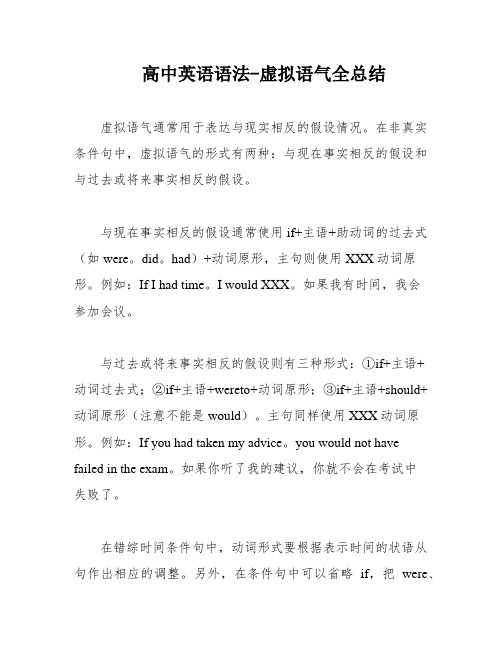
高中英语语法-虚拟语气全总结虚拟语气通常用于表达与现实相反的假设情况。
在非真实条件句中,虚拟语气的形式有两种:与现在事实相反的假设和与过去或将来事实相反的假设。
与现在事实相反的假设通常使用if+主语+助动词的过去式(如were。
did。
had)+动词原形,主句则使用XXX动词原形。
例如:If I had time。
I would XXX。
如果我有时间,我会参加会议。
与过去或将来事实相反的假设则有三种形式:①if+主语+动词过去式;②if+主语+wereto+动词原形;③if+主语+should+动词原形(注意不能是would)。
主句同样使用XXX动词原形。
例如:If you had taken my advice。
you would not have failed in the exam。
如果你听了我的建议,你就不会在考试中失败了。
在错综时间条件句中,动词形式要根据表示时间的状语从句作出相应的调整。
另外,在条件句中可以省略if,把were、had、should提到句首,变成倒装句式。
例如:Were I at school again。
I would study harder。
如果我还有上学的机会,我会更加努力研究。
Had you arrived earlier。
you would have caught the bus.If it rains tomorrow。
XXX climbing.What would you do with a n dollars?We couldn't have finished the work ahead of time without your help.Otherwise。
I would have taken part in the sports meeting.XXX me of your birthday。
or else I would have known nothing about it.A man who s drinking water would be dead in about seven days.I might have been XXX assistance。

⾼考英语语法之虚拟语⽓⾼考英语语法8虚拟语⽓⼀,if条件句中的虚拟语⽓虚拟语⽓是⼀种特殊的动词形式,主要⽤于在条件或让步状语从句中,表⽰说话⼈所说的话不是⼀个事实,⽽是⼀种假设、猜测、怀疑等;或者在名词性从句中,表⽰说话⼈的愿望、要求、命令、建议。
条件句有真实条件句与⾮真实条件句两种。
虚拟语⽓在条件句中:1,与过去事实相反的假设:条件句: If+主语+had done主句:主语+should, would, might, could + have doneShe would have gone to the party if she had been invited.2, 与现在事实相反的假设: 条件句: If+主语+did, 动词be⽤were主句:主语+should, would, might, could do3,与将来事实相反的假设:条件句: If+主语+did, 动词be⽤wereIf+主语+were to do;If+主语+should do主句:主语+should, would, might, could do, If it should fail, I would try again.4. 混合型的条件句当条件从句与主句所表的时间不⼀致时,虚拟语⽓的形式应作相应的调整。
主句和从句的谓语动词并不相互呼应,这种条件句叫混合条件句或错综时间条件句。
If you had followed my advice , you would be better now. Even though it hadn’t rained, we can’t get there by tomorrow. 条件虚拟主句真实。
⼆,名词性从句that+主语+(should) do结构中的虚拟语⽓下列情形下that 后⾯的从句中的谓语动词⽤:should do,should可以省略。
表过去⽤should have done.1,主语从句:在句型It is important/necessary/strange/natural that句型中,在It isdemanded/suggested/ordered/required/recommended/requested/ required that句型中,在It is a pity, a shame, no wonder, proposal, recommendation, suggestion, surprise, advice that句型中,表⽰某事重要、奇怪、⾃然、必要等,以及表⽰建议、命令、请求、道歉、怀疑、愿望等主观意愿等。